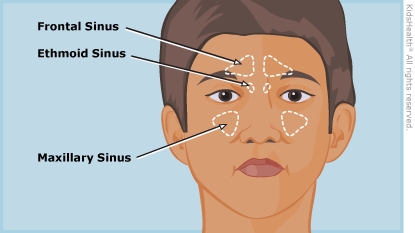Chronic sinusitis is when someone has sinusitis for more than 3 months. Sinusitis is the swelling and irritation of the linings of the sinuses. Sinuses are hollow spaces in the cheekbones, in the forehead, and behind the nose.
Treatment for chronic sinusitis may include antibiotics, allergy medicines, saline (saltwater) sprays or washes, and steroids (medicine to ease swelling) taken by mouth or as a nasal spray.
Follow these instructions to care for your child.



Your child:

Your child has:

Who gets chronic sinusitis? Chronic sinusitis is more common in people who have allergies or asthma, who smoke (or who are around smoke), who are around some types of pollution, who have a blockage in the nose or sinuses, or who have immune problems.
What are the symptoms of chronic sinusitis? Kids with chronic sinusitis may have a cough, a stuffy nose, yellow or green mucus from the nose, face pain or pressure, and loss of sense of smell. They may also feel tired or worn out.